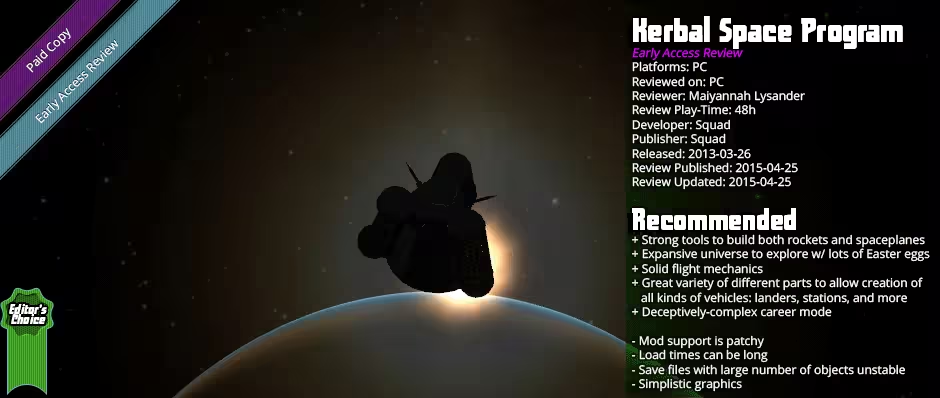

Kerbal Space Program is a simulation sandbox game in Steam's Early Access program developed and published by Squad. This is one of the originals, as it were, to the Steam Early Access program, and for all that program's faults, Kerbal Space Program is evidence that with a proper and trusted developer the program isn't without merit, as the game has come to encompass a simulation of depth and complexity with simultaneous ease that offers more in this game than many full-price, completed releases do.
The strength of Kerbal Space Program is
the insane amount of construction parts
There are hundreds of different parts available with which to construct your various vehicles, from command pods, to bays to contain satellites or rovers, to booster rockets, and more. They all serve their own purposes, with the different rockets having varying properties, with things like the proper Ideal Rocket Equation being simulated so you're rewarded for figuring out a proper weight, size, and composition.
It's easy to understate the various combinations available here, and much more proficient players than myself constructed some really brilliant, sprawling space stations, dropped colonies onto new worlds, and have a Kerbin system filled with a variety of space vehicles. There is a real sense of accomplishment in designing in your head a creative space station, arranging the various necessary launches, and seeing it all come together. It's the Minecraft axiom all over again: the pay-off is all the more rewarding for the road you had to take to get there, and it's a very carefully-balanced one.
A staggeringly big universe is simulated in KSP, rife with things to explore
There is an entire solar system simulated in Kerbal, complete with sun, various orbiting worlds, with their moons, travelling meteors, asteroids, and more. The various worlds all have their own atmopsheres and makeup, presenting their own aesthetic and terrains to explore with your space vehicles. The meteors are particular fun to yours truly, as they present quite a challenge to deal with, Rosetta-style, but there's plenty to find and love in the Kerbin system.
One of the brilliant things about Kerbal in this regards is something I touched on earlier, and that would be the persistence: you can put up as many rockets as you have crew for (unlimited, in sandbox mode!) and put together your own things, be they sprawling space stations, or complete little colonies. And it all stays there - the reason, no doubt, for the very simple graphics - unless they get destroyed, and indeed when you get into the whole colonising space thing, there becomes a whole other meta-game, making sure your stations don't collide with one another, or with those intersecting meteors.
The graphics are serviceable but very simple
Fidelity really is the one problem I have with Kerbal, but it's an admittedly big one for some people. This resembles a game out of the late 90s or early 2000s, and that's going to be a turn-off for some people. For my own subjective part, I do have some issues with it at times, but its more in the engine than the actual fidelity, which doesn't seem as tightly-optimised as something of this fidelity should be. While I do realise that complex simulations often make even powerful processors break down into tears, even simple sandbox launches with a single rocket with nothing up there can be a little jittery without any real decent reason.
That said, what is there is very stylishly presented, especially in the absolutely adorable look of wonder or abject fear in the Kerbals as you launch green men into space, and the art style while, as the graphical fidelity, is quite simple, it's also well-presented and does the best that it can with that.
Flight mechanics simulated in KSP are quite brilliant
Kerbal strikes a good balance here: it's easy to use the interface to learn the basic flight mechanics and put the simplest rockets into space, but it also provides a fairly-accurate flight model that is difficult to master completely, with even actual astronomers (hi Scott Manley!) and the like having some fun with the various complexities of that simulation. Indeed, it's what a simulator should do: simulate, and Kerbal does it quite well, offering that well-struck balance.
Probably the thing I enjoy most in the design here is the way that the progressive, incremental upgrades you get to the space-craft offer real-world solutions to the various problems you come across with launch and spaceflight, such as ways to correct spin, improve structural integrity, and more. The nature of the model being after something realistic and with a history of development over time allows the career mode to introduce increasing challenges, and tools to meet those goals effectively, over time. The difficulty curve increases with those challenges, and the tools you get through the game's research curve to find them does so at the same rate as well.
Career mode progression offers a pretty engaging game in tandem with the sim
The aforementioned career mode presents the basic pieces, and a starting Kerbal Space Center, and from there you have a variety of "Contracts" you can accept to get money, which will ask you to do different space tasks, such as reaching certain altitudes, researching certain phenomenons, or testing certain experimental parts. Along the way, you will find "science" parts to perform various experiments to in turn get you "science points" which drive the research and development aspect of the game. The DR&D is basically a tech tree, presenting a few branches by which you can select what components you wish to use next.
The simplicity is deceptive, as over time, the tasks after you will ramp up to greater and greater challenges, until those little green men (who incidentally you must train) are spanning the galaxy. Before you know it an entire night has slipped by and you're the proud owner of a new space station. Turn-based strategy games of good design often have a "one more turn" aspect to them, and Kerbal seems to have channeled that into a "one more launch" aspect. Its the iterative nature here that can captivate, as you launch, learn what you could have done differently, or get some new part to add, and then launch again, getting better and better in the process. This isn't a game where your nose feels like it's the grind stone - the increasing challenges are increasing fun as well, and that is the aspect so many simulators lack.
A great modding community surrounds Kerbal, but the actual support is thin
By that I don't mean the support for the mods themselves by their author - the community of Kerbal Space Program is probably one of the most upstanding in gaming right now. It's very much an enthusiast space, and players on the various forums are oft all too eager to help a new player learn the ropes, share their various mods, or even just their latest accomplishment or rocket design. It's a vital and vibrant community the likes of which gaming could use more of.
However, the support for the mods in the actual game is a little lacklustre. Updates to the game itself often break all the existing mods, often invalidating save files, and the methods by which I see mod authors able to do what they do seem clandestine and rather shoe-string - there, but very arcane and not accessible to the beginner. As a player rather than a modder in this case, the big thing for me was that the updates, which do happen fairly decently often, do tend to break mods, even mods that you would think might not be affected. It's an irritation, especially in an Early Access game, but hardly a game-ruiner.
Save games of very complex simulations can break
This wasn't an everyday occurrence and isn't common from what I gathered talking to the community, but neither is it truly rare - a save file that has enough stuff in it can break the game and the save along with it sometimes, when the game struggles to load that many physics objects into the game world. It happened to me twice, and it can be pretty heart-breaking to lose many hours of work in such a way. The old adage of "always back up your saves" comes into effect here.
Nonetheless, there truly is no other game like Kerbal Space Program, and even that couldn't dampen my enthusiasm for it, which says something very strongly indeed: it was just another chance to venture and explore again, and create all that comes along with it.


